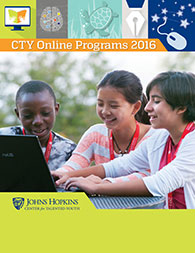Difference between revisions of "Competitive Mathematics for High School Students"
(Created page with "{{CTY Online Courses}} Competitive Mathematics for High School Students is a CTY Online course for high school students who have participated in either the AMC 10 or 1...") |
|||
| Line 1: | Line 1: | ||
{{CTY Online Courses}} | {{CTY Online Courses}} | ||
| − | [[Competitive Mathematics for High School Students]] is a [[CTY Online]] course for high school students who have participated in either the AMC 10 or 12 and have completed Precalculus. Its course code is [[CMH]] and the times are as follows: | + | [[Competitive Mathematics for High School Students]] is a [[CTY Online]] course for high school students who have participated in either the AMC 10 or 12 and have completed Precalculus. Its course code is [[CMH]], the course lasts 3 months and the times are as follows: |
Wednesdays from 9 pm-10:30 pm (Eastern Standard Time) | Wednesdays from 9 pm-10:30 pm (Eastern Standard Time) | ||
Revision as of 16:11, 14 March 2016
Competitive Mathematics for High School Students is a CTY Online course for high school students who have participated in either the AMC 10 or 12 and have completed Precalculus. Its course code is CMH, the course lasts 3 months and the times are as follows:
Wednesdays from 9 pm-10:30 pm (Eastern Standard Time)
Course Description
From the CTY Online Catalog:
This course is a very challenging problem-solving course for students who have participated in the AMC and are eager to take their skills to the next level.
In one part of the course, general problem-solving techniques are introduced, such as:
- the pigeon hole principle
- invariance principle
- extremal principle
- induction principle
- systematic checking
Some of these general problem-solving paradigms enjoy applicability outside of mathematics. In the other part of the course, these metholds are discussed in specific mathematical contexts such as:
number theory combinatorics, sequences polynomials In tackling non-routine problems whose solutions are not immediate, students are encouraged to approach problems from different angles. A further goal of this course is to improve a student's ability to write proofs. Students attend weekly virtual classroom sessions to discuss challenging problems.
Each topic covered in the course is independent of the other topics. One topic is taught a week on a continuous repeating basis. Students will not necessarily start with "Topic 1" in their first week of enrollment, but all topics will be covered in a 3-month enrollment. When all topics are covered, a student then takes the final exam.
